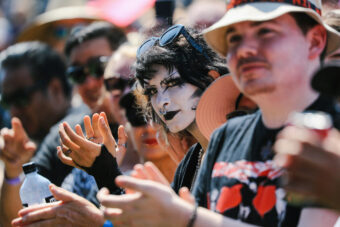“I like ‘Late Night’ a lot,” says Foals frontman Yannis Phillipakis of a personal favorite from his band’s latest, Holy Fire. “I feel like it’s got everything: elements of classic funk and soul, all of it turned inside out like a squid or the Pompidou.” And turning themselves inside out, Philippakis says, was paramount during the creation of their recently released follow-up to 2010’s Total Life Forever. Recorded last year in the North London neighborhood of Willesden with esteemed production duo Flood and Alan Moulder, it’s a record that saw Philippakis and his bandmates attempting to better express their “mental topography” in a way they hadn’t yet before: by letting go.
“We’d gotten over the romance and idea of going to some far-flung location and making a record there,” he says from Warner Bros.’ Manhattan offices, referencing time spent in Gothenburg, Sweden, working in isolation on Total Life Forever. “I’m always a little disbelieving of how much an external environment can affect your record. Because if you’re just in a studio for 18 hours a day, all that really matters is your internal landscape. I have such a tendency to wormhole, such a monoscopic drive about the band and about the records and wanting to devote myself to them and sacrifice everything for them that I would overload them.” He takes a breath and cracks a smile. “But I definitely turned down my worry gland a bit. Before, some of the more extroverted moments [on Holy Fire] would have probably been overanalyzed, diluted down, and twisted up. I was restrained in a way that was beneficial to the record. You’ve got to open a window once in a while.”
The adjustment helped make for what is certainly Foals’ strongest effort to date, a record rife with haymaking grooves and soulful expanse meant to mirror at times the “feral chaos” of the fivesome’s live show. During the writing process in Oxford, Philippakis says, longtime guitarist Jimmy Smith left guitar duties to take over on Rhodes piano, a step that opened up spaces in the songs that weren’t there before. “Instead of it being about the architecture of two guitars and how they would interlock, it become more fluid,” Philippakis says. “Roles in the band became less defined. There was a refreshing lack of discussion. I definitely want to get the band to a point where its almost a telepathic thing, where we don’t need to discuss anything anymore. It can all bypass the head, just be heart to instrument to microphone to speaker. We don’t feel like we’re always need to fill the space now. Partly, that’s just us becoming more aware as we grow older. It’s not just what you play, but when you play and what not to play.”
And working in London with Flood and Moulder, an “incredibly secure pair of hands” as Philippakis calls them, helped Foals come to “be a part of Britain and make a British record,” an idea to which they’d previously seemed allergic. “Personally, I’m a little bit skeptical of British heritage,” he says. “The Union Jack, the Hiwatt amp, the mods: I never felt comfortable with that. And with this record, we didn’t need to be so antagonistic. We didn’t need to try to escape the perceived shackles of being a British band. With Flood and Moulder, there was a really strong trust in the process, and a belief in being open to everything, rather than coming at it with this slightly caffeinated, Woody Allen-like fear.”

Also Read
Welcome to the Year of Indie Sleaze
Once cast aside, that fear made way for the colossal moves of singles like “Your Number” and “Inhaler,” the latter a cut that towers over much of Foals’ songbook. “We come from a place where we’ve denied ourselves the use of effects pedals,” Philippakis says. “But I listen to Earth and Sleep. I don’t see why I should have to deny myself anymore. We’re okay writing big grooves now, without feeling mawkish or embarrassed about it. I wrote the chorus riff for ‘Inhaler’ three years ago and only came around to being okay with it now. Some of that is just us indulging ourselves. It’s like we’re one of those women that looks at themselves in the mirror in a new way. We appreciate our curves now.”




